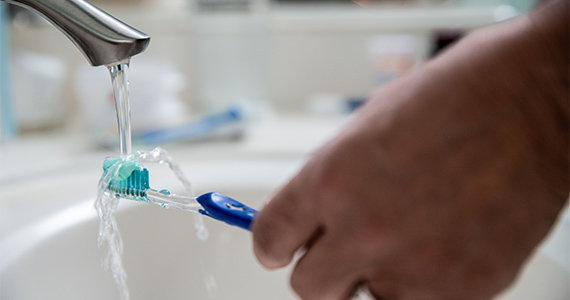Dental Care for Dementia and Alzheimer's Patients
Learn more about dental care for those with dementia and Alzheimer's.

Dementia, Alzheimer's and Oral Health
Dementia is the general term used to describe a decline in mental ability that interferes with daily life. It is caused by damage to brain cells, and there are many conditions that may cause it. Alzheimer's disease is the most common cause of dementia. It is a progressive and eventually devastating brain disorder caused by complex brain changes and cell damage that worsens over time. It causes problems with memory, thinking and behavior.
As Alzheimer's progresses, symptoms lead to memory changes, confusion and behavioral changes. Loved ones might notice that the person with the disease may not remember to brush their teeth, remember why dental care is important or may become confused or uncooperative when undergoing dental treatment. Oral health can greatly affect one's overall health. This makes preventive dental care extremely important during the early stages of Alzheimer's.
Daily Oral Care for a Person with Alzheimer's
Daily preventive oral care is crucial in the early stages of Alzheimer's. Care should include regular professional exams and cleanings, any necessary follow-up care and daily brushing and flossing. These activities can help prevent dental pain, eating issues, digestive problems and infection. Good oral care also helps reduce the need for future dental treatment when the person may be unable to tolerate extensive procedures.
If you are caring for a loved one with Alzheimer's or dementia who is having difficulty with oral care at home, try following these oral healthcare tips provided by the Alzheimer's Association:
- Give simple, short instructions, breaking down the process when needed: "Pick up your toothbrush", "Put some toothpaste on the toothbrush", "Brush your teeth."
- Demonstrate brushing by holding the toothbrush and brushing for them or by gently guiding their hand while they brush.
- If you brush for them, use a soft-bristle toothbrush in a gentle circular motion, at a 45-degree angle, for at least two minutes, twice a day.
- Floss daily, if possible. If it is too difficult for you, try using an interdental brush (Proxabrush®) which is a tiny, tube-shaped brush to clean between teeth. You can also try a floss holder if regular floss is too difficult.
- Rinse dentures and partials after each meal. Brush them once a day and soak them in a denture cleanser each night. While they are out of the mouth, clean the gums, tongue and roof of the mouth with a soft toothbrush or wet gauze.
- If brushing is challenging, try using a different type of toothbrush, like a child's toothbrush, a long handled toothbrush or angled toothbrush. Sometimes, using electric toothbrushes may be confusing.
- If, despite your best efforts, you are unable to brush their teeth, do not try to force it—try again later.
Not all caregivers are able to provide dental care at home because it can sometimes be too difficult. If you are unable to provide care or assistance, ask their dentist for advice.
Professional Care
Every effort should be made to continue routine dental exams, cleanings and treatment while in the early stages of Alzheimer's or dementia. A dentist who has experience working with dementia, Alzheimer's and elderly patients may also be helpful.
Provide the dentist with a list of the person's healthcare providers and a detailed medication list. This will allow the dentist to coordinate care with their physician(s) and other caregivers, when necessary.
Suggestions for a successful dental visit:
- If you find the person tends to be more alert at a certain time of day, try scheduling their appointment at that time.
- Remind them of the appointment at least one day in advance.
- Make sure they visit the restroom before the appointment.
- Ask for clear follow-up instructions and the dates of future appointments in writing.
Dental Pain
Individuals diagnosed with Alzheimer's often have trouble communicating when they are in pain:
- Look for any signs of sores or pain points when brushing and flossing.
- Watch for rubbing/touching of the cheek/jaw, moaning and flinching when touching the face and refusal to wear dentures/partials.
- Look for signs of discomfort during mealtimes. Strained facial expressions or refusal to eat could indicate mouth pain or poorly fitting dentures/partials.
Note: The information in this document is not meant to replace the advice of your dentist or another licensed healthcare professional. Talk to your dentist for any specific dental advice.






